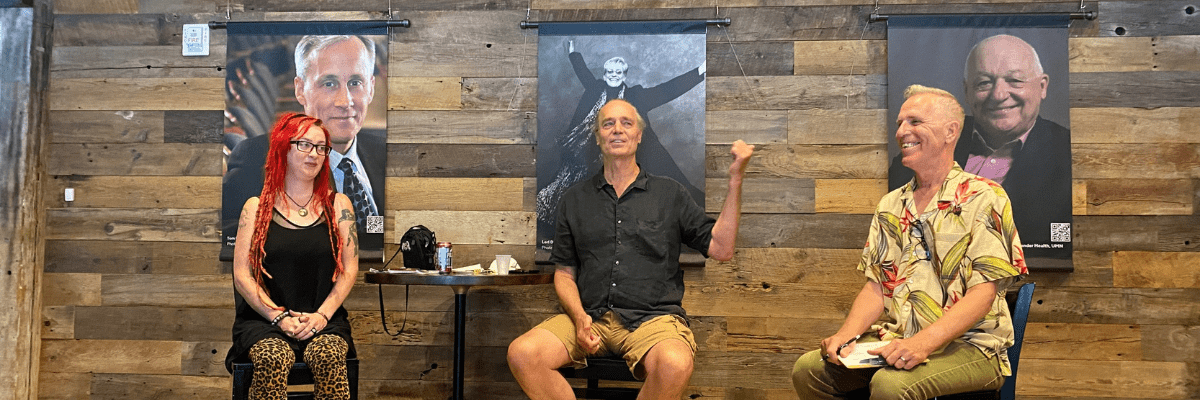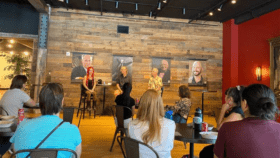Trust hosts community Pride conversation

Kat Morgan, Patrick Scully and Tim Carroll host a panel interview at The Hennepin to celebrate Pride Month and discuss the past, present and future of Twin Cities Pride Month
Article written by Aileen Dosev, Bank of America Student Leader
On June 30, Hennepin Theatre Trust staff and members of the Hennepin Theatre District community gathered in Jack Link’s Legend Lounge to celebrate Pride Month and hear from leaders in the LGBTQIA+ community about the past, present and future of Pride Month in the Twin Cities.
The event was part of the Trust’s long-term goal of ensuring equity and establishing a safe and inclusive environment through education and celebration of diverse identities in the arts. As part of its commitment to diversity, equity, and inclusion, the Trust was honored to host guest speakers Patrick Scully and Kat Morgan for an afternoon celebration of LGBTQIA+ culture and its place within the arts.
Patrick Scully (he/him) is a veteran member of the local arts community and the founder of Patrick’s Cabaret. He has played an instrumental role in organizing annual Pride celebrations in Minneapolis. In collaboration with the Trust’s LGBTQIA+ art exhibit, Patrick’s Cabaret will host a special performance at Hennepin Theatre Trust’s performance space, “Studio 900,” at The Hennepin on Saturday, July 16, 2022.
Kat Morgan (she/her) is a co-lead vocalist of hybrid goth industrial punk band, Apocalypse Theatre, and long-time performer in the clubs of Minneapolis’ Theatre District. Apocalypse Theatre will also be featured at the upcoming cabaret.
Scully and Morgan shared their personal journeys as LGBTQIA+ artists and spoke about the intersection of art and expression of their identity in a panel discussion led by Tim Carroll (he/him), Hennepin Theatre Trust’s archivist.
Morgan and Scully were first asked, “What does Pride mean to you?”
Morgan acknowledged Pride’s origins as a riot and protest in response to LGBTQIA+ oppression, defining modern Pride as a continuation of that activism. She shared that for her, the movement is about “having pride in yourself, lifting up your community and helping give voice to people that haven’t found their voice yet.”
Scully defined Pride as “the opposite of invisibility”: being confident enough to display one’s gayness and overcome the fear of societal rejection. He emphasized the importance of marches and public events and the role they play in boosting the morale of the LGBTQ+ community. As the conversation progressed, the guests discussed how the visibility of Pride has improved over the years despite the adversity that remains.
When recounting the first Pride celebration they attended, the speakers had similar stories.
“Pride in ‘78 was about 50 people sitting on the hillside […] watching drag in the harsh reality of the midday sun,” Scully explained, “I knew about half of them.”
Morgan’s first Pride experience was a small parade in ‘90s Tulsa, Oklahoma. “It wasn’t as well promoted as Pride is now,” she commented.
Both described their doubts and fears when faced with the brutality of anti-gay protesters and the potential threat of violence. Morgan spoke about her inner conflicts over whether to engage or attempt to ignore agitators and her concerns of being targeted by alt-right groups as an LGBTQIA+ performer at past Pride events.
“There were some nasty things said that always stuck with me,” she said. “But it’s nice to see how Pride progresses through the years. Obviously, there are still people who don’t agree with it […] but it’s a far cry from the tiny one I went to in Tulsa.”
Scully agreed, reminiscing about a Pride parade he once attended in New York. “I remember a crowd of more pedestrians than I’ve ever seen at a time,” he described., “I thought ‘wow, this is so different than the world I grew up in.’”
The conversation then transitioned to Morgan and Scully’s involvement in the arts, and how their identities are part of the work they produce.
Scully explained how his main goal in starting Patrick’s Cabaret was to increase access for artists to get on stage. For him, this means highlighting women, people of color, and people who are LGBTQIA+ and/or disabled in his show.
Regarding his personal performing work, Scully explained that “if you don’t see yourself represented in society, you start to feel crazy. A big part of what I’ve done as a performing artist is to put my life onstage […] so that other people who are in similar situations start to see their lives reflected back at them.”
Although Scully’s creative work focuses on the LGBTQIA+ perspective, he adds that inclusive stories resonate with non-gay viewers as well. By portraying universal themes and emotions through an underrepresented lens, he hopes to bridge misunderstanding and division.
“My identity is kind of like a north star,” Scully said. “I use it as a tool for my activism.”
For Morgan, much of her LGBTQIA+ identity is expressed during her performances.
“When I’m on stage, I sing loud and I dance very angry. Yet there’s also a happiness to it, because performing is how I get my emotions out.”
Morgan described her concerts as environments where all styles of makeup and dress are accepted.
“It’s a fun, safe place to not be judged,” she said., “I hope that [people] come to the show and feel free.”
Ultimately, Morgan and Scully find hope and encouragement in the face of challenges by focusing on the positive and community support. Both speakers emphasized the importance of taking a break from fear-based media and focusing on the creative work of other artists. In this way, people can give more of their energy towards positivity than negativity.
Morgan recounts her nervousness before performing at a past Pittsburgh Pride event.: “Is anyone going to cause trouble, are we safe?”
“As soon as I got to the park and was surrounded by people, that thought immediately went away,” she said. “Part of how I deal with things is surrounding myself with […] people like me and feeling supported by my community.”
“For people to have courage, they need to feel less alone,” Scully added.
The conversation came to a close as the panel discussed their goals for the future of Pride and the gay community.
Scully wishes for an increasingly universal celebration of Pride and amplified acceptance of LGBTQIA+ individuals. “Let’s understand ourselves independent of the old ways of categorizing,” he said..”
“I hope [Pride] grows. I hope more people start coming out as themselves,” said Morgan.
Although there is still progress to be made, Morgan and Scully showed listeners that there is so much to celebrate. By providing a stage for local artists and fostering connections, Hennepin Theatre Trust continues to act out its mission of making the Hennepin Theatre District a vibrant and welcoming place for all.